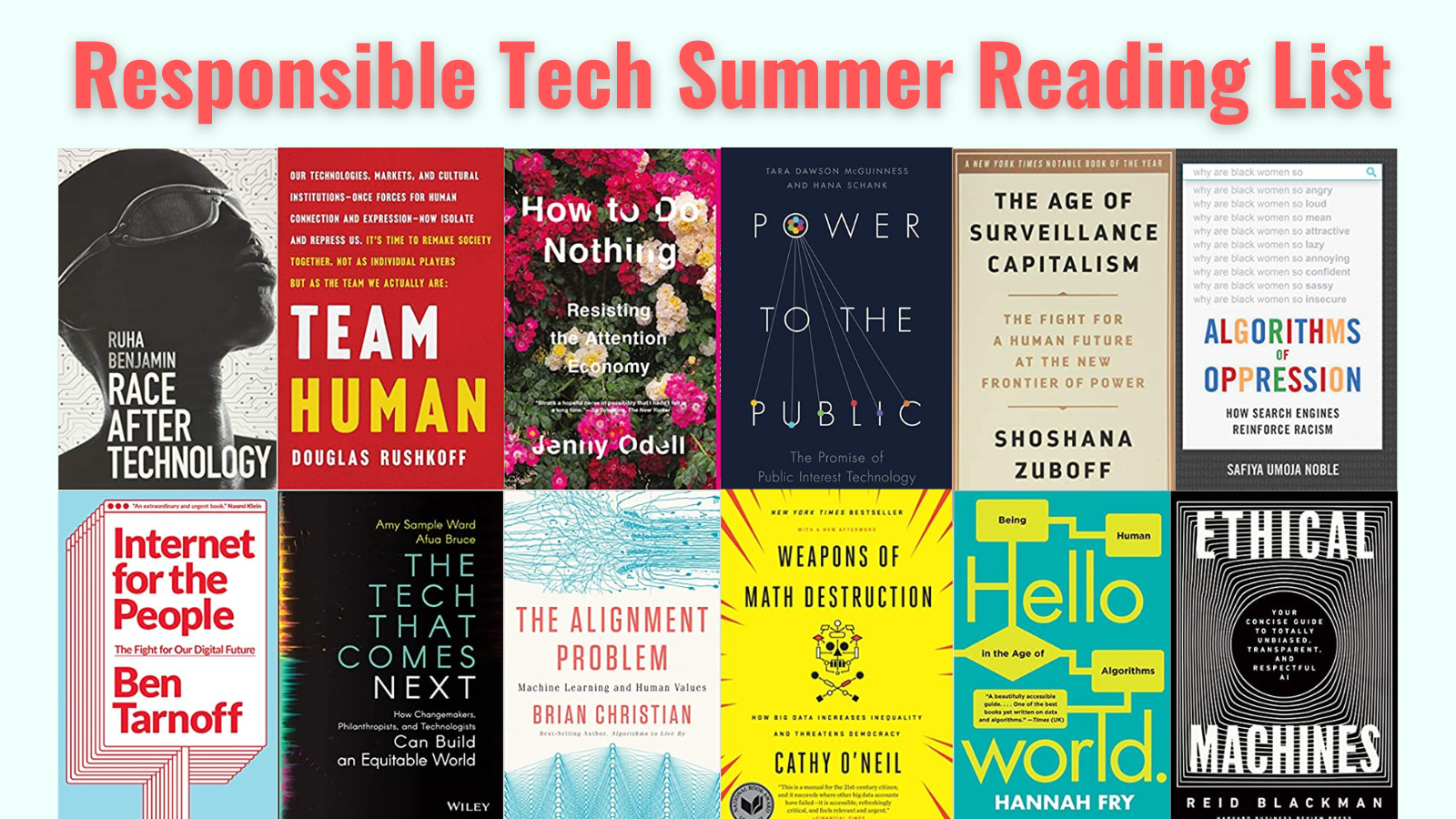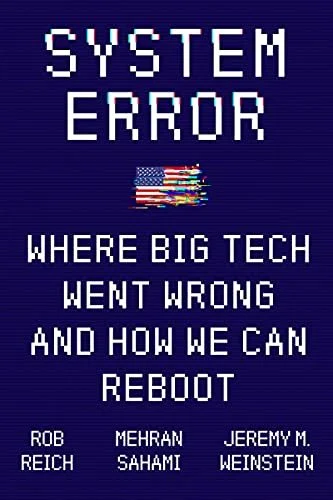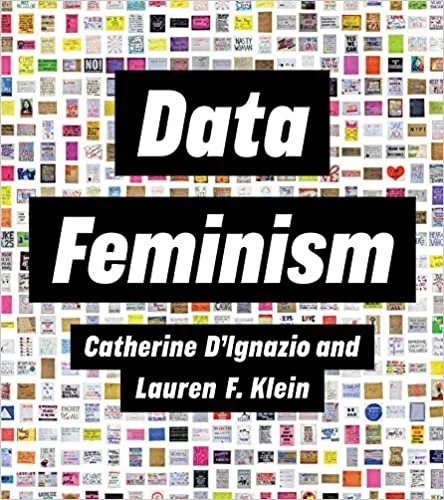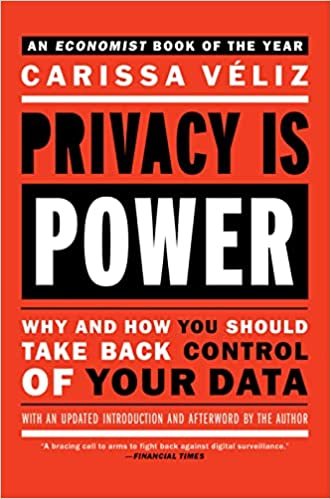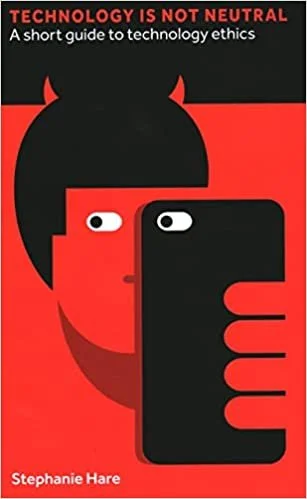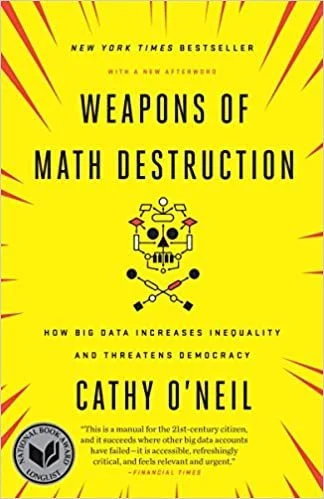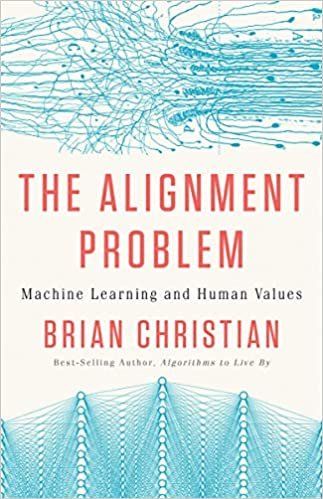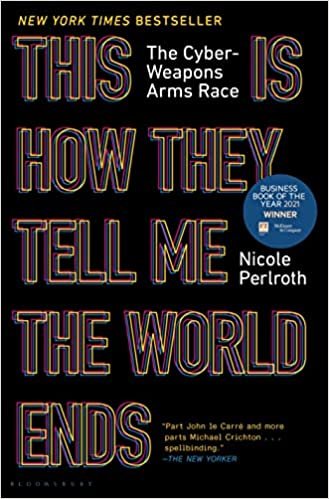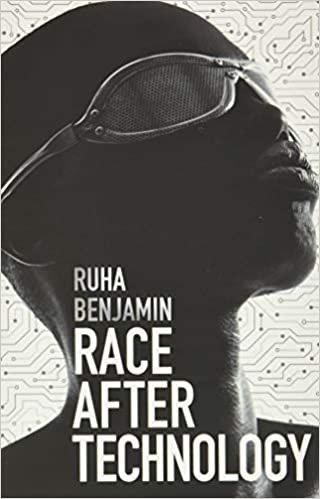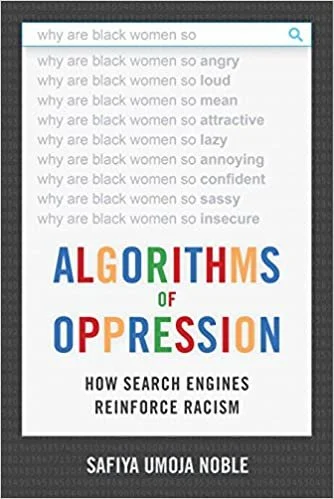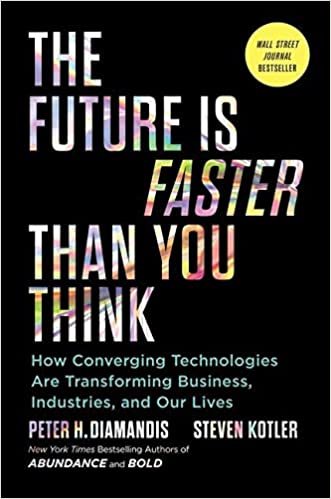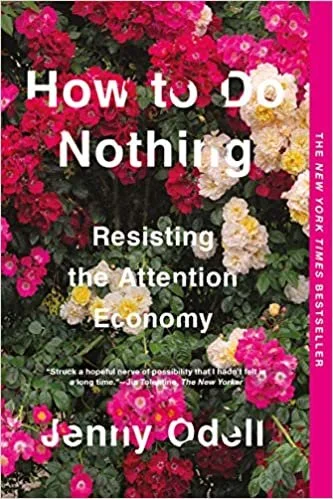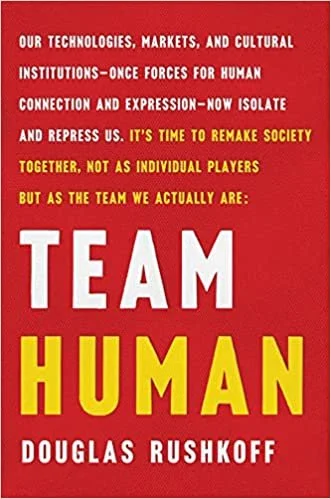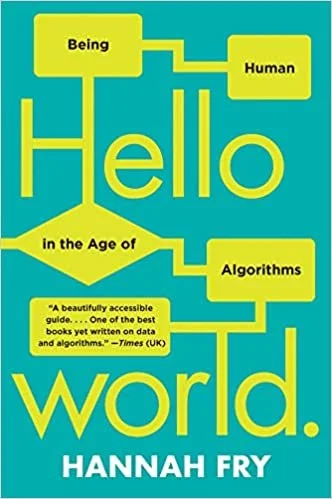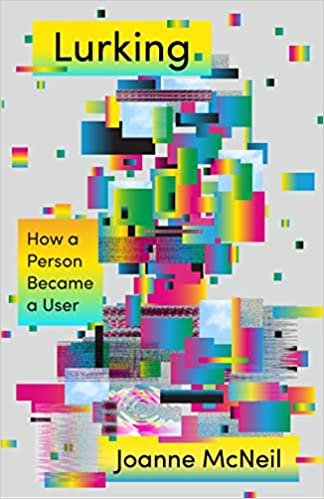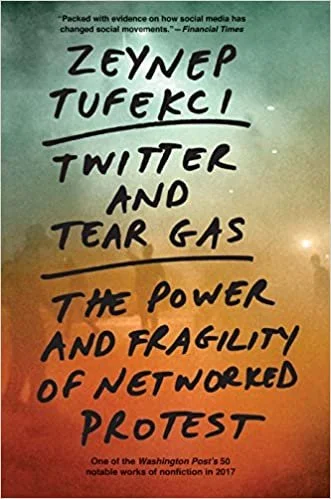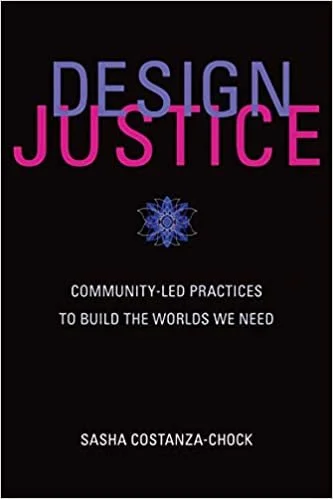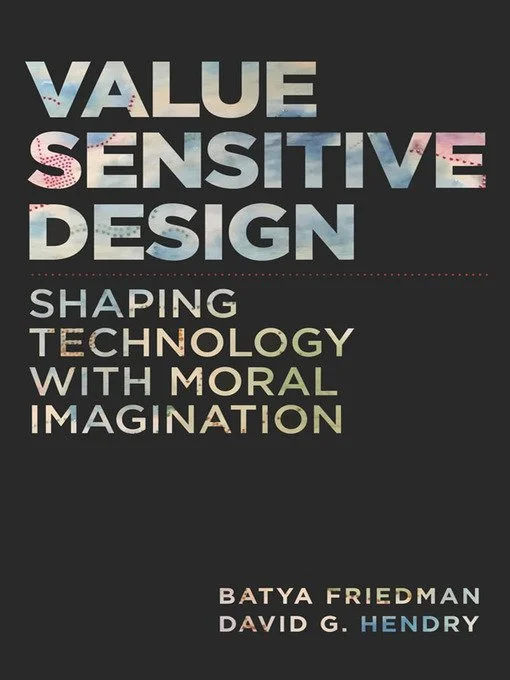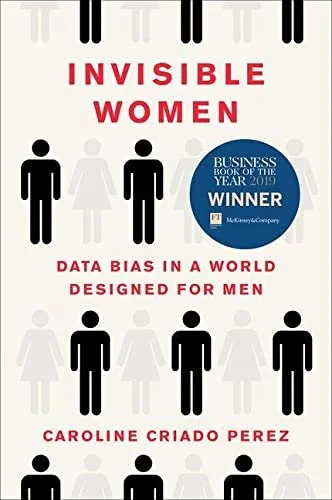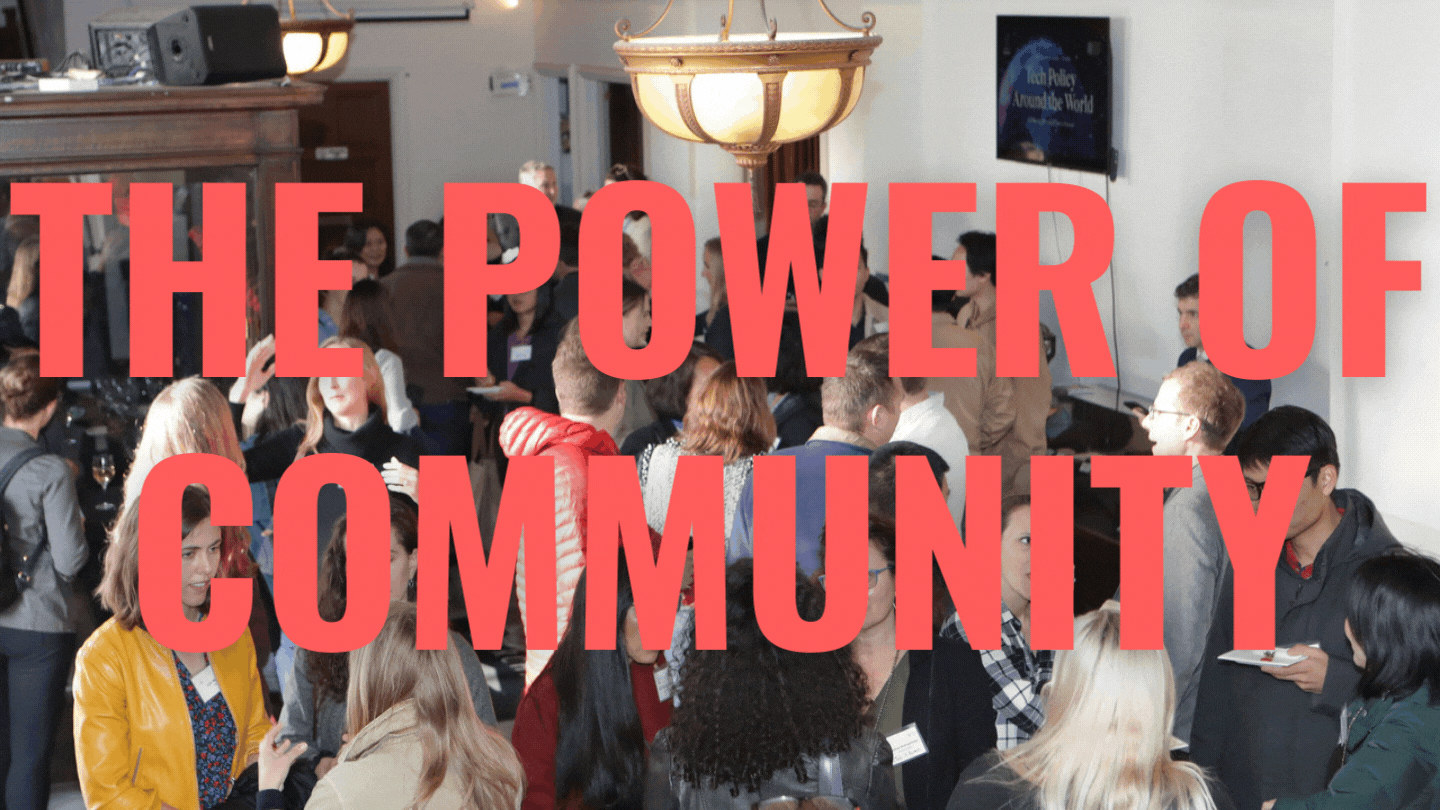Responsible Tech Summer Reading List
There are a wide-range of books, both non-fiction and fiction, that are helping inform and inspire people across the globe to get involved in the Responsible Tech movement (co-creating a tech future aligned with the public interest). Below is a list of some of books recommended by our community.
Do you have a book you’d like to recommend for the Responsible Tech Summer Reading List? Submit your suggestions through this form.
RESPONSIBLE TECH SUMMER READING LIST (with more being added!) includes:
•A Future So Bright by Kate O'Neill
•Algorithms of Oppression: How Search Engines Reinforce Racism by Safiya Umoja Noble
•Artificial Unintelligence: How Computers Misunderstand the World by Meredith Broussard
•Atlas of AI by Kate Crawford
•Custodians of the Internet by Tarleton Gillespie
•Data Feminism by Catherine D'Ignazio and Lauren Klein
•Design Justice by Sasha Costanza-Chock
•Dignity in the Digital Age by Ro Khanna
•Ethical Machines by Reid Blackman
•Fake Accounts by Lauren Oyler
•Freedom to Think by Susie Alegre
•Future Ethics by Cennydd Bowles
•Hello World: Being Human in the Age of Algorithms by Hannah Fry
•History, Disrupted by Jason Steinhauer
•How to Do Nothing: Resisting the Attention Economy by Jenny Odell
•Invisible Women by Caroline Criado Perez
•Lurking: How a Person Became a User by Joanne McNeil
•Machine See, Machine Do by Patrick K. Lin
•New Dark Age: Technology and the End of the Future by James Bridle
•Out of Touch by Michelle Drouin
•Power to the Public: The Promise of Public Interest Technology by Tara Dawson McGuinness and Hana Schank
•Race After Technology by Ruha Benjamin
•Radical Technologies: The Design of Everyday Life by Adam Greenfield
•Speech Police by David Kaye
•System Error: Where Big Tech Went Wrong and How We Can Reboot by Rob Reich, Mehran Sahami, and Jeremy M. Weinstein
•Team Human by Douglas Rushkoff
•Technically Wrong by Sara Wachter-Boettcher
•Technology and the Virtues by Shannon Vallor
•Technology Is Not Neutral: A Short Guide to Technology Ethics by Stephanie Hare
•The Age of Surveillance Capitalism by Shoshana Zuboff
•The Alignment Problem: Machine Learning and Human Values by Brian Christian
•The Digital Closet: How the Internet Became Straight by Alexander Monea
•The Future Is Faster Than You Think by Peter Diamandis and Steven Kotler
•The Ministry for the Future by Kim Stanley Robinson
•The Shame Machine by Cathy O'Neil
•The Tech That Comes Next by Amy Sample Ward and Afua Bruce
•This Is How They Tell Me the World Ends by Nicole Perlroth
•Throwing Rocks at the Google Bus by Douglas Rushkoff
•Twitter and Tear Gas by Zeynep Tufekci
•Understanding Media by Marshall McLuhan
•Value Sensitive Design by Batya Friedman and David Hendry
•Weapons of Math Destruction by Cathy O'Neil
BOOK DESCRIPTION: “System Error exposes the root of our current predicament: how big tech’s relentless focus on optimization is driving a future that reinforces discrimination, erodes privacy, displaces workers, and pollutes the information we get. This optimization mindset substitutes what companies care about for the values that we as a democratic society might choose to prioritize. Well-intentioned optimizers fail to measure all that is meaningful and, when their creative disruptions achieve great scale, they impose their values upon the rest of us.
Armed with an understanding of how technologists think and exercise their power, three Stanford professors—a philosopher working at the intersection of tech and ethics, a political scientist who served under Obama, and the director of the undergraduate Computer Science program at Stanford (also an early Google engineer)—reveal how we can hold that power to account. Troubled by the values that permeate the university’s student body and its culture, they worked together to chart a new path forward, creating a popular course to transform how tomorrow’s technologists approach their profession. Now, as the dominance of big tech becomes an explosive societal conundrum, they share their provocative insights and concrete solutions to help everyone understand what is happening, what is at stake, and what we can do to control technology instead of letting it control us.”
Recommended by Rebekah Tweed
BOOK DESCRIPTION: “Making a case against technochauvinism—the belief that technology is always the solution—Broussard argues that it's just not true that social problems would inevitably retreat before a digitally enabled Utopia. To prove her point, she undertakes a series of adventures in computer programming. She goes for an alarming ride in a driverless car, concluding “the cyborg future is not coming any time soon”; uses artificial intelligence to investigate why students can't pass standardized tests; deploys machine learning to predict which passengers survived the Titanic disaster; and attempts to repair the U.S. campaign finance system by building AI software. If we understand the limits of what we can do with technology, Broussard tells us, we can make better choices about what we should do with it to make the world better for everyone.”
BOOK DESCRIPTION: “Today, data science is a form of power. It has been used to expose injustice, improve health outcomes, and topple governments. But it has also been used to discriminate, police, and surveil. This potential for good, on the one hand, and harm, on the other, makes it essential to ask: Data science by whom? Data science for whom? Data science with whose interests in mind? The narratives around big data and data science are overwhelmingly white, male, and techno-heroic. In Data Feminism, Catherine D'Ignazio and Lauren Klein present a new way of thinking about data science and data ethics—one that is informed by intersectional feminist thought.”
Recommended by Ismael Kherroubi Garcia, FRSA
BOOK DESCRIPTION: “Governments and hundreds of corporations are spying on you, and everyone you know. They're not just selling your data. They're selling the power to influence you and decide for you. Even when you've explicitly asked them not to. Reclaiming privacy is the only way we can regain control of our lives and our societies. These governments and corporations have too much power, and their power stems from us--from our data. Privacy is as collective as it is personal, and it's time to take back control. Privacy Is Power tells you how to do exactly that. It calls for the end of the data economy and proposes concrete measures to bring that end about, offering practical solutions, both for policymakers and ordinary citizens.”
Recommended by Ismael Kherroubi Garcia, FRSA
BOOK DESCRIPTION “Technology Is Not Neutral: A Short Guide to Technology Ethics addresses one of today’s most pressing problems: how to create and use tools and technologies to maximize benefits and minimize harms? Drawing on the author’s experience as a technologist, political risk analyst and historian, the book offers a practical and cross-disciplinary approach that will inspire anyone creating, investing in or regulating technology, and it will empower all readers to better hold technology to account.”
Recommended by Ismael Kherroubi Garcia, FRSA
“These books tackle different questions of AI ethics from different perspectives. Data Feminism provides numerous case studies that can help reflect on questions of social justice in AI. Privacy is Power focuses on quests of surveillance. Vallor’s book describes geographically diverse philosophies that can inform AI ethics frameworks. And Hare brings an industry-informed perspective to the table.”
BOOK DESCRIPTION: “We live in the age of the algorithm. Increasingly, the decisions that affect our lives—where we go to school, whether we can get a job or a loan, how much we pay for health insurance—are being made not by humans, but by machines. In theory, this should lead to greater fairness: Everyone is judged according to the same rules. But as mathematician and data scientist Cathy O’Neil reveals, the mathematical models being used today are unregulated and uncontestable, even when they’re wrong. Most troubling, they reinforce discrimination—propping up the lucky, punishing the downtrodden, and undermining our democracy in the process. Welcome to the dark side of Big Data.”
Recommended by Jacob Rozran & Nathan Butters
“This book highlights a number of examples of how and why algorithms can be biased. ”
BOOK DESCRIPTION: “O’Neil explores the machinery behind all this shame, showing how governments, corporations, and the healthcare system capitalize on it. There are damning stories of rehab clinics, reentry programs, drug and diet companies, and social media platforms—all of which profit from “punching down” on the vulnerable. Woven throughout The Shame Machine is the story of O’Neil’s own struggle with body image and her recent weight-loss surgery, which awakened her to the systematic shaming of fat people seeking medical care…With clarity and nuance, O’Neil dissects the relationship between shame and power. Whom does the system serve? Is it counter-productive to call out racists, misogynists, and vaccine skeptics? If so, when should someone be “canceled”? How do current incentive structures perpetuate the shaming cycle? And, most important, how can we all fight back?”
Recommended by Chelsea Quilling, graduate student
“It’s an in-depth, critical look at the human cost of technology-mediated perpetuation of shame related to things people don’t control— obesity, poverty, disability, addiction, and more. ”
BOOK DESCRIPTION: “Today’s “machine-learning” systems, trained by data, are so effective that we’ve invited them to see and hear for us―and to make decisions on our behalf. But alarm bells are ringing. Recent years have seen an eruption of concern as the field of machine learning advances. When the systems we attempt to teach will not, in the end, do what we want or what we expect, ethical and potentially existential risks emerge. Researchers call this the alignment problem…In best-selling author Brian Christian’s riveting account, we meet the alignment problem’s “first-responders,” and learn their ambitious plan to solve it before our hands are completely off the wheel.”
Recommended by Geoff Schaefer & Nathan Butters
“The Alignment Problem is the single best book I’ve read on AI ethics and safety. And Technology and the Virtues is the only book I know that’s attempting to bring Virtue Ethics into our work, which I think is incredibly fruitful and, additionally, a more promising approach than Utilitarianism most commonly found in tech.”
BOOK DESCRIPTION: “Filled with spies, hackers, arms dealers, and a few unsung heroes, written like a thriller and a reference, This Is How They Tell Me the World Ends is an astonishing feat of journalism. Based on years of reporting and hundreds of interviews, The New York Times reporter Nicole Perlroth lifts the curtain on a market in shadow, revealing the urgent threat faced by us all if we cannot bring the global cyber arms race to heel.”
BOOK DESCRIPTION: “From everyday apps to complex algorithms, Ruha Benjamin cuts through tech-industry hype to understand how emerging technologies can reinforce White supremacy and deepen social inequity. Benjamin argues that automation, far from being a sinister story of racist programmers scheming on the dark web, has the potential to hide, speed up, and deepen discrimination while appearing neutral and even benevolent when compared to the racism of a previous era.”
Recommended by Mélissa M’Raidi-Kechichian, DIACC & Patrick K. Lin
“This book addressed the intersection and needed interdisciplinarity of race and technology, their dynamic and importance.”
BOOK DESCRIPTION: “In Algorithms of Oppression, Safiya Umoja Noble challenges the idea that search engines like Google offer an equal playing field for all forms of ideas, identities, and activities. Data discrimination is a real social problem; Noble argues that the combination of private interests in promoting certain sites, along with the monopoly status of a relatively small number of Internet search engines, leads to a biased set of search algorithms that privilege whiteness and discriminate against people of color, specifically women of color.”
Recommended by
BOOK DESCRIPTION: “This book locates a key to that future in the distant past: specifically, in the philosophical traditions of virtue ethics developed by classical thinkers from Aristotle and Confucius to the Buddha. Each developed a way of seeking the good life that equips human beings with the moral and intellectual character to flourish even in the most unpredictable, complex and unstable situations--precisely where we find ourselves today. Through an examination of the many risks and opportunities presented by rapidly changing technosocial conditions, Vallor makes the case that if we are to have any real hope of securing a future worth wanting, then we will need more than just better technologies. We will also need better humans.”
Recommended by Ismael Kherroubi Garcia
BOOK DESCRIPTION: “In this masterwork of original thinking and research, Shoshana Zuboff provides startling insights into the phenomenon that she has named surveillance capitalism. The stakes could not be higher: a global architecture of behavior modification threatens human nature in the twenty-first century just as industrial capitalism disfigured the natural world in the twentieth.”
Recommended by
“Each of the books I recommend are critical to understanding the impact of Technology on Society. They are all helpful in developing an understanding of what we face to move towards a better future together. They do not provide answers, they invite you to think of your own and to understand that you must join with others to improve our prospects for the future.”
BOOK DESCRIPTION: “An exploration of how heteronormative bias is deeply embedded in the internet, hidden in algorithms, keywords, content moderation, and more. In The Digital Closet, Alexander Monea argues provocatively that the internet became straight by suppressing everything that is not, forcing LGBTQIA+ content into increasingly narrow channels—rendering it invisible through opaque algorithms, automated and human content moderation, warped keywords, and other strategies of digital overreach. Monea explains how the United States’ thirty-year “war on porn” has brought about the over-regulation of sexual content, which, in turn, has resulted in the censorship of much nonpornographic content—including material on sex education and LGBTQIA+ activism. In this wide-ranging, enlightening account, Monea examines the cultural, technological, and political conditions that put LGBTQIA+ content into the closet.”
Recommended by Laura Weinstein
“The author deploys a mountain of evidence to demonstrate how heteronormativity (and, often, whiteness) has been encoded into the algorithms that govern the sites we use on the Internet. Often, content moderators are influenced by conservative groups such as NCOSE to over-police content, to the frequent disadvantage of marginalized populations. ”
BOOK DESCRIPTION: “Technology is accelerating far more quickly than anyone could have imagined. During the next decade, we will experience more upheaval and create more wealth than we have in the past hundred years. In this gripping and insightful roadmap to our near future, Diamandis and Kotler investigate how wave after wave of exponentially accelerating technologies will impact both our daily lives and society as a whole. What happens as AI, robotics, virtual reality, digital biology, and sensors crash into 3D printing, blockchain, and global gigabit networks? How will these convergences transform today’s legacy industries? What will happen to the way we raise our kids, govern our nations, and care for our planet?”
Recommended by Catherine Knibbs
“Kotler’s book is a look to a non Black Mirror type technologies that are predicted to arrive and the questions they bring.”
BOOK DESCRIPTION: “The Ministry for the Future is a masterpiece of the imagination, using fictional eyewitness accounts to tell the story of how climate change will affect us all. Its setting is not a desolate, postapocalyptic world, but a future that is almost upon us. Chosen by Barack Obama as one of his favorite books of the year, this extraordinary novel from visionary science fiction writer Kim Stanley Robinson will change the way you think about the climate crisis.”
Recommended by Cheryl Wheeler
“Holistic, multidisciplinary, intersectional alternative view of human foibles, policy (in)action, technology solutions. ”
BOOK DESCRIPTION: “In a world where addictive technology is designed to buy and sell our attention, and our value is determined by our 24/7 data productivity, it can seem impossible to escape. But in this inspiring field guide to dropping out of the attention economy, artist and critic Jenny Odell shows us how we can still win back our lives…Odell sees our attention as the most precious—and overdrawn—resource we have. And we must actively and continuously choose how we use it. We might not spend it on things that capitalism has deemed important … but once we can start paying a new kind of attention, she writes, we can undertake bolder forms of political action, reimagine humankind’s role in the environment, and arrive at more meaningful understandings of happiness and progress.”
Recommended by Andrew Sears & Amy Van Es
BOOK DESCRIPTION: “Everywhere we turn, a startling new device promises to transfigure our lives. But at what cost? In this urgent and revelatory excavation of our Information Age, leading technology thinker Adam Greenfield forces us to reconsider our relationship with the networked objects, services and spaces that define us. It is time to re-evaluate the Silicon Valley consensus determining the future.”
Recommended by Andrew Sears
BOOK DESCRIPTION: “From rogue financial systems to shopping algorithms, from artificial intelligence to state secrecy, we no longer understand how our world is governed or presented to us. The media is filled with unverifiable speculation, much of it generated by anonymous software, while companies dominate their employees through surveillance and the threat of automation. In his brilliant new work, leading artist and writer James Bridle surveys the history of art, technology, and information systems, and reveals the dark clouds that gather over our dreams of the digital sublime.”
Recommended by Andrew Sears
BOOK DESCRIPTION: “When Marshall McLuhan first coined the phrases "global village" and "the medium is the message" in 1964, no-one could have predicted today's information-dependent planet. No-one, that is, except for a handful of science fiction writers and Marshall McLuhan. Understanding Media was written twenty years before the PC revolution and thirty years before the rise of the Internet. Yet McLuhan's insights into our engagement with a variety of media led to a complete rethinking of our entire society. He believed that the message of electronic media foretold the end of humanity as it was known. In 1964, this looked like the paranoid babblings of a madman. In our twenty-first century digital world, the madman looks quite sane. Understanding Media: the most important book ever written on communication. Ignore its message at your peril.”
BOOK DESCRIPTION: “Team Human is a manifesto―a fiery distillation of preeminent digital theorist Douglas Rushkoff’s most urgent thoughts on civilization and human nature. In one hundred lean and incisive statements, he argues that we are essentially social creatures, and that we achieve our greatest aspirations when we work together―not as individuals. Yet today society is threatened by a vast antihuman infrastructure that undermines our ability to connect. Money, once a means of exchange, is now a means of exploitation; education, conceived as a way to elevate the working class, has become another assembly line; and the internet has only further divided us into increasingly atomized and radicalized groups.”
“All of these books illuminate the interaction between the technologies we design, our understanding of the self, and the systems and institutions that mediate much of our lived experience.”
BOOK DESCRIPTION: “In this groundbreaking book, acclaimed media scholar and author Douglas Rushkoff tells us how to combine the best of human nature with the best of modern technology. Tying together disparate threads—big data, the rise of robots and AI, the increasing participation of algorithms in stock market trading, the gig economy, the collapse of the eurozone—Rushkoff provides a critical vocabulary for our economic moment and a nuanced portrait of humans and commerce at a critical crossroads.”
Recommended by Firuza Huseynova, student
“Social networks surrender their original missions to more immediately profitable data mining, while brokerage houses abandon value investing for algorithms that drain markets and our 401ks alike—all tactics driven by the need to stoke growth by any means necessary. Rushkoff offers a series of practical steps for businesses, consumers, investors, and policymakers to remake the economic operating system from the inside out. ”
BOOK DESCRIPTION: “The Internet has changed the past. Social media, Wikipedia, mobile networks, and the viral and visual nature of the Web have inundated the public sphere with historical information and misinformation, changing what we know about our history and History as a discipline. This is the first book to chronicle how and why it matters. Why does History matter at all? What role do history and the past play in our democracy? Our economy? Our understanding of ourselves? How do questions of history intersect with today’s most pressing debates about technology; the role of the media; journalism; tribalism; education; identity politics; the future of government, civilization, and the planet? At the start of a new decade, in the midst of growing political division around the world, this information is critical to an engaged citizenry. As we collectively grapple with the effects of technology and its capacity to destabilize our societies, scholars, educators and the general public should be aware of how the Web and social media shape what we know about ourselves - and crucially, about our past.”
Recommended by David Ryan Polgar
BOOK DESCRIPTION: “AI and other high-tech tools embed and reinforce America’s history of prejudice and exclusion — even when they are used with the best intentions. Patrick K. Lin’s Machine See, Machine Do: How Technology Mirrors Bias in Our Criminal Justice System takes a deep and thorough look into the use of technology in the criminal justice system, and investigates the instances of coded bias present at every level.”
Recommended by David Ryan Polgar
[Coming out July 12]
Book Description: “The promise of artificial intelligence is automated decision-making at scale, but that means AI also automates risk at scale. Are you prepared for that risk? Already, many companies have suffered real damage when their algorithms led to discriminatory, privacy-invading, and even deadly outcomes. Self-driving cars have hit pedestrians; HR algorithms have precluded women from job searches; mortgage systems have denied loans to qualified minorities. And often the companies who deployed the AI couldn't explain why the black box made the decision it did. In this environment, AI ethics isn't merely an academic curiosity, it's a business necessity. In Ethical Machines, Reid Blackman gives you all you need to understand AI ethics as a risk management challenge. He'll help you build, procure, and deploy AI in a way that's not only ethical but also safe in terms of your organization's reputation, regulatory compliance, and legal standing—and do it at scale.”
Recommended by David Ryan Polgar
BOOK DESCRIPTION: “Between climate change, the impact on the future of work by intelligent automation, misinformation, and more, humanity faces several exponential changes and existential threats simultaneously. Yet there are reasons to lean into hope: emerging technology, for example, also brings with it tremendous power and offers the potential to solve human problems at scale. Achieving the best outcomes possible now is largely a matter of collective action and political will. The best way — indeed perhaps the only way — to confront the challenges we face and build a better tomorrow is to allow ourselves to envision the brightest future possible, while at the same time acknowledging the ways the future could go dark and working to prevent them from happening. Kate O’Neill, author of Tech Humanist and Pixels and Place, explores the ways we have already begun to solve human problems at scale, and makes the case for an approach that’s both hopeful and strategic as our best chance at a truly bright future.”
Recommended by David Ryan Polgar
BOOK DESCRIPTION: “Millions of people around the world are not getting the physical, emotional, and intellectual intimacy they crave. Through the wonders of modern technology, we are connecting with more people more often than ever before, but are these connections what we long for? Pandemic isolation has made us even more alone. In Out of Touch, professor of psychology Michelle Drouin investigates what she calls our intimacy famine, exploring love, belongingness, and fulfillment and considering why relationships carried out on technological platforms may leave us starving for physical connection. Drouin puts it this way: when most of our interactions are through social media, we are taking tiny hits of dopamine rather than the huge shots of oxytocin that an intimate in-person relationship would provide.”
Recommended by David Ryan Polgar
BOOK DESCRIPTION: “When it comes to artificial intelligence, we either hear of a paradise on earth or of our imminent extinction. It’s time we stand face-to-digital-face with the true powers and limitations of the algorithms that already automate important decisions in healthcare, transportation, crime, and commerce. Hello World is indispensable preparation for the moral quandaries of a world run by code, and with the unfailingly entertaining Hannah Fry as our guide, we’ll be discussing these issues long after the last page is turned.”
“It made me pay attention to the big yet subtle influence of tech on society and vice-versa. It’s as if I realised that I was a somnambulist prior to reading the book.”
BOOK DESCRIPTION: “In the digital age, unequal access to technology and the revenue it creates is one of the most pressing issues facing the United States. There is an economic gulf between those who have struck gold in the tech industry and those left behind by the digital revolution; a geographic divide between those in the coastal tech industry and those in the heartland whose jobs have been automated; and existing inequalities in technological access—students without computers, rural workers with spotty WiFi, and plenty of workers without the luxury to work from home…Dignity in the Digital Age tackles these challenges head-on and imagines how the digital economy can create opportunities for people all across the country without uprooting them. Congressman Ro Khanna of Silicon Valley offers a vision for democratizing digital innovation to build economically vibrant and inclusive communities. Instead of being subject to tech’s reshaping of our economy, Representative Khanna argues that we must channel those powerful forces toward creating a more healthy, equal, and democratic society.”
Recommended by Camille Carlton, Policy and Communications Lead, Center for Humane Technology
BOOK DESCRIPTION: “What happens when artificial intelligence saturates political life and depletes the planet? How is AI shaping our understanding of ourselves and our societies? Drawing on more than a decade of research, award‑winning scholar Kate Crawford reveals how AI is a technology of extraction: from the minerals drawn from the earth, to the labor pulled from low-wage information workers, to the data taken from every action and expression. This book reveals how this planetary network is fueling a shift toward undemocratic governance and increased inequity. Rather than taking a narrow focus on code and algorithms, Crawford offers us a material and political perspective on what it takes to make AI and how it centralizes power. This is an urgent account of what is at stake as technology companies use artificial intelligence to reshape the world.”
Recommended by Matt Henderson, COO Ethical Intelligence Associates, Limited & Patrick Lin
BOOK DESCRIPTION: “A woman in a tailspin discovers that her boyfriend is an anonymous online conspiracy theorist in this “absolutely brilliant take on the bizarre and despicable ways the internet has warped our perception of reality” (Elle, One of the Most Anticipated Books of the Year).”
Recommended by Amy Van Es, Founder of Memo
BOOK DESCRIPTION: “In a shockingly short amount of time, the internet has bound people around the world together and torn us apart and changed not just the way we communicate but who we are and who we can be. It has created a new, unprecedented cultural space that we are all a part of―even if we don’t participate, that is how we participate―but by which we’re continually surprised, betrayed, enriched, befuddled. We have churned through platforms and technologies and in turn been churned by them. And yet, the internet is us and always has been…In Lurking, Joanne McNeil digs deep and identifies the primary (if sometimes contradictory) concerns of people online: searching, safety, privacy, identity, community, anonymity, and visibility. She charts what it is that brought people online and what keeps us here even as the social equations of digital life―what we’re made to trade, knowingly or otherwise, for the benefits of the internet―have shifted radically beneath us. It is a story we are accustomed to hearing as tales of entrepreneurs and visionaries and dynamic and powerful corporations, but there is a more profound, intimate story that hasn’t yet been told.”
Recommended by Amy Van Es
BOOK DESCRIPTION: “As the speed and complexity of the world increases, governments and nonprofit organizations need new ways to effectively tackle the critical challenges of our time―from pandemics and global warming to social media warfare. In Power to the Public, Tara Dawson McGuinness and Hana Schank describe a revolutionary new approach―public interest technology―that has the potential to transform the way governments and nonprofits around the world solve problems. Through inspiring stories about successful projects ranging from a texting service for teenagers in crisis to a streamlined foster care system, the authors show how public interest technology can make the delivery of services to the public more effective and efficient.”
Recommended by Patrick Lin
BOOK DESCRIPTION: “Buying groceries, tracking our health, finding a date: whatever we want to do, odds are that we can now do it online. But few of us realize just how many oversights, biases, and downright ethical nightmares are baked inside the tech products we use every day. It’s time we change that. In Technically Wrong, Sara Wachter-Boettcher demystifies the tech industry, leaving those of us on the other side of the screen better prepared to make informed choices about the services we use―and to demand more from the companies behind them.”
Recommended by Patrick Lin
BOOK DESCRIPTION: “To understand a thwarted Turkish coup, an anti–Wall Street encampment, and a packed Tahrir Square, we must first comprehend the power and the weaknesses of using new technologies to mobilize large numbers of people. An incisive observer, writer, and participant in today’s social movements, Zeynep Tufekci explains in this accessible and compelling book the nuanced trajectories of modern protests—how they form, how they operate differently from past protests, and why they have difficulty persisting in their long-term quests for change.”
Recommended by Patrick Lin
“For the most part, I think these books are approachable and explain complex issues in tech in a digestible way. They also focus on many of the ethical tech issues All Tech Is Human cares about: human relationships with social media, privacy, public interest technology, and racial bias.”
BOOK DESCRIPTION: “The internet was designed to be a kind of free-speech paradise, but a lot of the material on it turned out to incite violence, spread untruth, and promote hate. Over the years, three American behemoths—Facebook, YouTube and Twitter—became the way most of the world experiences the internet, and therefore the conveyors of much of its disturbing material…What should be done about this enormous problem? Should the giant social media platforms police the content themselves, as is the norm in the U.S., or should governments and international organizations regulate the internet, as many are demanding in Europe? How do we keep from helping authoritarian regimes to censor all criticisms of themselves? David Kaye, who serves as the United Nations’ special rapporteur on free expression, has been has been at the center of the discussions of these issues for years. He takes us behind the scenes, from Facebook’s “mini-legislative” meetings, to the European Commission’s closed-door negotiations, and introduces us to journalists, activists, and content moderators whose stories bring clarity and urgency to the topic of censorship. Speech Police is the most comprehensive and insightful treatment of the subject thus far, and reminds us of the importance of maintaining the internet’s original commitment to free speech, free of any company’s or government’s absolute control, while finding ways to modulate its worst aspects.”
Recommended by Elyse Lee, Head of trust and safety policy and partnership/Naver Z
BOOK DESCRIPTION: “In this revealing and nuanced exploration, award‑winning sociologist and cultural observer Tarleton Gillespie provides an overview of current social media practices and explains the underlying rationales for how, when, and why these policies are enforced. In doing so, Gillespie highlights that content moderation receives too little public scrutiny even as it shapes social norms and creates consequences for public discourse, cultural production, and the fabric of society. Based on interviews with content moderators, creators, and consumers, this accessible, timely book is a must‑read for anyone who’s ever clicked “like” or “retweet.”
Recommended by David Ryan Polgar
BOOK DESCRIPTION: “Changing the way we use, develop, and fund technology for social change is possible, and it starts with you. The Tech That Comes Next: How Changemakers, Philanthropists, and Technologists Can Build an Equitable World outlines a vision of a more equitable and just world along with practical steps to creating it, appropriately leveraging technology along the way…Ideal for nonprofit leaders, social activists, policymakers, technologists, entrepreneurs, founders, managers, and other business leaders, The Tech That Comes Next belongs in the libraries of anyone who envisions a world in which technology helps advance, rather than hinders, positive social change.”
Recommended by David Ryan Polgar
BOOK DESCRIPTION: “Technology was never neutral; its social, political, and moral impacts have become painfully clear. But the stakes will only get higher as connected cameras will watch over the city, algorithms oversee society’s most critical decisions, and transport, jobs, and even war will become automated. The tech industry hasn’t yet earned the trust these technologies demand…Based on Cennydd’s years of research and consulting, Future Ethics transforms modern ethical theory into practical advice for designers, product managers, and software engineers alike. Cennydd uses the three lenses of modern ethics to focus on some of the tech industry’s biggest challenges: unintended consequences and algorithmic bias, the troubling power of persuasive technology, and the dystopias of surveillance, autonomous war, and a post-work future.”
Recommended by Lisa Hehnke
BOOK DESCRIPTION: “This book explores the theory and practice of design justice, demonstrates how universalist design principles and practices erase certain groups of people—specifically, those who are intersectionally disadvantaged or multiply burdened under the matrix of domination (white supremacist heteropatriarchy, ableism, capitalism, and settler colonialism)—and invites readers to “build a better world, a world where many worlds fit; linked worlds of collective liberation and ecological sustainability.” Along the way, the book documents a multitude of real-world community-led design practices, each grounded in a particular social movement. Design Justice goes beyond recent calls for design for good, user-centered design, and employment diversity in the technology and design professions; it connects design to larger struggles for collective liberation and ecological survival.”
Recommended by Lisa Hehnke
BOOK DESCRIPTION: In Value Sensitive Design, Batya Friedman and David Hendry describe how both moral and technical imagination can be brought to bear on the design of technology. With value sensitive design, under development for more than two decades, Friedman and Hendry bring together theory, methods, and applications for a design process that engages human values at every stage…After presenting the theoretical foundations of value sensitive design, which lead to a deep rethinking of technical design, Friedman and Hendry explain seventeen methods, including stakeholder analysis, value scenarios, and multilifespan timelines. Following this, experts from ten application domains report on value sensitive design practice. Finally, Friedman and Hendry explore such open questions as the need for deeper investigation of indirect stakeholders and further method development…This definitive account of the state of the art in value sensitive design is an essential resource for designers and researchers working in academia and industry, students in design and computer science, and anyone working at the intersection of technology and society.”
Recommended by Christiane Grünloh, Senior Researcher, Roessingh Research and Development at the University of Twente
“Value sensitive design is a systematic approach, framework and methodology to take human values into account when designing interactive systems. When it comes to the realisation that ‘All tech is human’ the human values that people have is at the core of responsible development. ”
BOOK DESCRIPTION: “Celebrated feminist advocate Caroline Criado Perez investigates this shocking root cause of gender inequality in the award-winning, #1 international bestseller Invisible Women. Examining the home, the workplace, the public square, the doctor’s office, and more, Criado Perez unearths a dangerous pattern in data and its consequences on women’s lives. Product designers use a “one-size-fits-all” approach to everything from pianos to cell phones to voice recognition software, when in fact this approach is designed to fit men. Cities prioritize men’s needs when designing public transportation, roads, and even snow removal, neglecting to consider women’s safety or unique responsibilities and travel patterns. And in medical research, women have largely been excluded from studies and textbooks, leaving them chronically misunderstood, mistreated, and misdiagnosed…Built on hundreds of studies in the United States, in the United Kingdom, and around the world, and written with energy, wit, and sparkling intelligence, this is a groundbreaking, highly readable exposé that will change the way you look at the world.”
Recommended by Amanda White, UX Researcher, Player Quality and Insights
“In order to inform decisions on a massive scale, we use big data to understand the people it effects. When those databases hold majority male information, we make decisions using male information and it ends up harming women.
Test dummies for cars are made using a ‘typical’ male build. City builders don’t have information on their people in poverty (majority female) and thus don’t clean or de-ice sidewalks for those who need to walk, or prioritize budget for more brightly lit and video-recorded transit. Machine learning pulls from databases that are filled with male-centered data, creating programs that don’t recognize female voices. Game teams make decisions using game research which contains at most a small percentage of women players, and even less for Black or Latino players, meaning those decisions creates more games that are centered around the perceived quality men have.
Currently, our organization is striving to create a diverse and inclusive game spaces, and in order to do that, we need data from diverse folk. This book shows the reader just how many gaps we have, and provides suggestions on what we can do in the future. ”
BOOK DESCRIPTION: “Without a moment's pause, we share our most intimate thoughts with trillion-dollar tech companies. Their algorithms categorize us and jump to conclusions about who we are. They even shape our everyday thoughts and actions - from who we date to how we vote. But this is just the latest front in an age-old struggle…Part history and part manifesto, Freedom to Think charts the history and importance of our most basic human right: freedom of thought. From Galileo to Nudge Theory to Alexa, human rights lawyer Susie Alegre explores how the powerful have always sought to get inside our heads, influence how we think and shape what we buy.”
Recommended by Hilary Sutcliffe, Director of SocietyInside
“Susie Alegre, an international Human Rights lawyer has written Freedom to Think, a very clear and engagingly written look at how we are inadvertently, post by post, click by click giving away the most fundamental of our human rights - the freedom to think.
Companies know us better than we know ourselves, accumulate knowledge of our thoughts, emotions, hopes, dreams, the state of our mental and physical health, in real time, and sell it to whoever wants to use it, who in turn intervene to shape our next thoughts. Our freedom to think what we like and not have it held against us, is breeched.
Surveillance and potential neurotech applications in the workplace and predictive policing, which seeks look into our heads to identify our very emotions, thoughts, views and decide whether we get or keep a job or our liberty, or not, fundamentally breeches this most important human right. The fact that it is used when it doesn’t even work properly and can’t really read our thoughts as well as they say, is also problematic, as organisations think it does and that matters too. A classic example of Bullshit Tech.
Human Rights issues and laws will increasingly impact the shape of tech development beyond ethics, and companies who haven’t thought of that need to start. A salutary read, even for those in the sector who read a lot.
The book also reminded me that George Orwell was a genius to have predicted this so well in his book 1984. I keep meaning to re read, and this wil be the stimulus to do that.”
👋Check out our Responsible Tech Summer Reading 📚List! We just added a few new books to this growing collection.https://t.co/DNuqViakau
— All Tech Is Human (@AllTechIsHuman) July 6, 2022
🤔Know of other great books we should add? Let us know through the interest form! #ResponsibleTech


